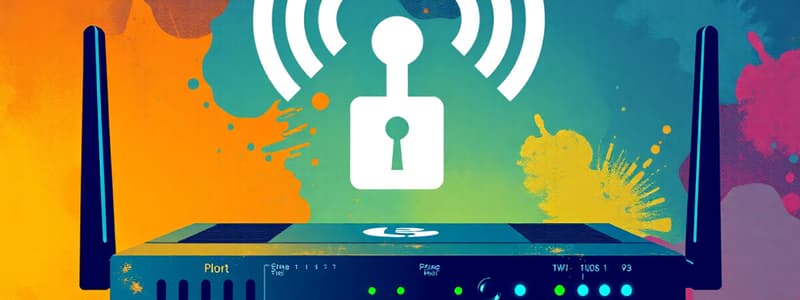Podcast
Questions and Answers
Which wireless encryption methods are mentioned for protecting data?
Which wireless encryption methods are mentioned for protecting data?
- SSL and TLS
- VPN and HTTP
- SSH and FTP
- WEP and WPA/WPA2 (correct)
Why is encryption important for wireless networks?
Why is encryption important for wireless networks?
- To allow more devices to connect
- To protect transmitted data (correct)
- To improve connection range
- To enhance speed
When should the default option be kept in an Internet connection setting?
When should the default option be kept in an Internet connection setting?
- When using a permanent IP address.
- If connecting via a dynamic IP address. (correct)
- When using a DSL-based ISP.
- If the ISP does not support DHCP.
What does the 'Keep Alive' option accomplish in a Static IP configuration?
What does the 'Keep Alive' option accomplish in a Static IP configuration?
Which of the following is NOT required to configure a Static IP connection?
Which of the following is NOT required to configure a Static IP connection?
What does Dynamic Domain Name System (DDNS) allow you to do?
What does Dynamic Domain Name System (DDNS) allow you to do?
What action should be taken if you already have a DHCP server in your network?
What action should be taken if you already have a DHCP server in your network?
Where should you sign up for DDNS service?
Where should you sign up for DDNS service?
What is the default setting for the DHCP server in the router?
What is the default setting for the DHCP server in the router?
Which feature is selected by default to enhance network security against external users?
Which feature is selected by default to enhance network security against external users?
What is the initial configuration of the Filter Internet NAT Redirection feature?
What is the initial configuration of the Filter Internet NAT Redirection feature?
What connection type is appropriate for users who need a permanent IP address?
What connection type is appropriate for users who need a permanent IP address?
What is the purpose of the Gateway address in an Internet connection setup?
What is the purpose of the Gateway address in an Internet connection setup?
Which tab should you select to change the Router's password?
Which tab should you select to change the Router's password?
What is the default Internet Connection Type for the Router?
What is the default Internet Connection Type for the Router?
What is the maximum number of DHCP users that can be assigned IP addresses in the router configuration?
What is the maximum number of DHCP users that can be assigned IP addresses in the router configuration?
Which encryption method is not supported by WPA2?
Which encryption method is not supported by WPA2?
What is the default encryption algorithm for WPA2?
What is the default encryption algorithm for WPA2?
What type of security is RADIUS primarily associated with?
What type of security is RADIUS primarily associated with?
Which statement is true regarding WPA compared to WEP?
Which statement is true regarding WPA compared to WEP?
Flashcards are hidden until you start studying
Study Notes
Router Wall Mounting
- Wall mounting hardware is included with this router, ensure you use safe and secure hardware
- The screws are designed to be 152 mm (6 inches) apart
- To install the router, make sure the wall you use is smooth, flat, dry, sturdy, and within reach of an electrical outlet
Wireless Security
- Wireless networks are convenient and easy to install
- Use WPA/WPA2 or WEP for security
- Enable encryption in settings
Static IP
- Use this setting if your internet connection requires a permanent IP address
- This router provides a setting for internet IP and a Subnet mask which may be required by your ISP
- Ensure you have the Gateway and static DNS address from your ISP
PPPoE
- Used by some DSL-based ISPs
- Select ‘Obtain an IP Address Automatically’ if your internet connection uses DHCP
- The 'Max Idle Time' setting allows you to terminate the connection after a set number of minutes (defaults to 5 minutes)
Keep Alive Setting
- This setting automatically re-establishes your internet connection if it drops
- Use the ‘Redial Period’ field to set how often the router checks for connection
- The default setting is 30 seconds
Telstra Cable
- Used by some internet providers in Australia
- This setting should only be selected if your ISP provides L2TP services
- Requires input of Username, Password, and Heartbeat Server IP address from Telstra
L2TP
- Used by some internet providers in Israel
- Requires a Username, Password, and L2TP Server IP address
DHCP
- DHCP is enabled by default
- Select 'Disable' to stop using DHCP if another DHCP server is present on your network
- The 'Starting IP Address' setting allows you to configure a range of IP addresses for DHCP
DDNS
- Dynamic Domain Name System
- DDNS allows you to assign a permanent domain name to a dynamic IP address
- Use DDNS when hosting a website, FTP server, or other services
DNS Services
- Two DDNS providers are supported, DynDNS.org and TZO.com
- Select 'DynDNS.org' or 'TZO.com' from the dropdown menu for your preferred DDNS service
- DDNS screen settings will vary depending on the service provider
Fragmentation Threshold
- Sets the maximum size of a packet before the data is fragmented
- Higher values may cause poor network performance, only reduce slightly if required
- The default value is 2346
RTS Threshold
- This setting defines the size of a packet that will trigger the RTS/CTS mechanism
- Should only be reduced slightly if you experience inconsistent data flow
- This threshold is typically left at the default value of 2347
Blocking Internet Requests
- The ‘Block Anonymous Internet Requests’ setting makes it harder for outside users to access your network
- It is enabled by default, deselect to allow anonymous requests
Filter Multicast
- Multicast allows multiple recipients to receive data simultaneously
- Filter Multicast is enabled by default, you can disable it to allow multicast packets
Filter Internet NAT Redirection
- This feature is not enabled by default
- Select this setting to block access to local servers from devices on your network
Wireless Network Security
- Use WPA/WPA2 encryption for wireless networks to protect data going through the airwaves
- Change the default SSID (network name) to something unique
- Use a strong password for your network and change it regularly
- Turn off file sharing to prevent unauthorized access
Router Setup
- The Router's default IP address is 192.168.1.1
- The default password is "admin"
- The Router can be configured with a web browser
- Setup Wizard can be used for initial configuration
Internet Connection Types
- Internet Setup section configures the Router to your internet connection
- Common internet connection types include:
- Automatic Configuration - DHCP
- Static IP
- PPPoE
- PPTP
- L2TP
- Telstra Cable
Wireless Security Modes
- The Router supports six wireless security modes:
- WPA2 Personal
- WPA Personal
- WPA2 Enterprise
- WPA Enterprise
- RADIUS
- WEP
- Wi-Fi Protected Setup (WPS) can be used to simplify the configuration of client devices
- WPA2 is the most secure security standard and supports two encryption methods:
- AES
- TKIP + AES
Router Configuration
- Use WPA2 Personal security mode and AES encryption algorithm for the highest level of security
- Set a strong WPA Shared Key of 8-63 characters
- Configure Group Key Renewal period to instruct the Router how often it should change encryption keys
- The default Group Key Renewal period is 3600 seconds
- In the Security Mode section, you can access the RADIUS Server Address and RADIUS Port fields when selecting WPA2 Enterprise or WPA Enterprise security modes
Studying That Suits You
Use AI to generate personalized quizzes and flashcards to suit your learning preferences.




